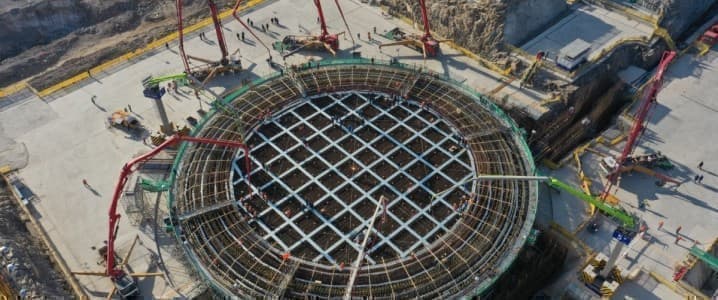The Shidaowan nuclear power plant, which features the world's first fourth-generation reactor, started commercial operations on December 6, China National Nuclear Corporation (CNNC), one of the project's developers, said.
"China's independently developed high-temperature gas-cooled reactor demonstrator commenced commercial operation," CNNC said in a statement.
"It signifies that China has completed the world's first commercially operational modular nuclear power plant with fourth-generation nuclear technology, marking the transition of fourth-generation nuclear technology from experiments to the commercial market."
Generation IV reactors are considered safer and more efficient.
"The tests confirmed that commercial-scale reactors could be cooled down naturally without emergency core cooling systems for the first time in the world. It is the so-called inherently safe reactor," Tsinghua University, one of the joint developers of the reactor, said.
Such reactors can produce heat, electricity, and hydrogen and would help China and the world "become carbon neutral," Zhang Zuoyi, dean of the Tsinghua University Institute of Nuclear and New Energy Technology and chief designer of the Shidaowan reactor project, told South China Morning Post.
The fourth-generation reactor in operation now puts China "ahead of other countries in terms of nuclear technology research and development," Francois Morin, China director of industry group World Nuclear Association, told The Wall Street Journal.
According to Morin, Western countries are set to launch their fourth-generation nuclear reactors only in the early 2030s.
David Fishman, a China-based senior manager at energy consulting firm Lantau Group, told the Journal that "China is arguably peerless in actually building and commercializing next-generation nuclear power technology."
Many countries in the West, with the notable exception of Germany, have recognized that nuclear power generation would help them achieve net-zero emission goals.
At the COP28 climate summit currently underway in Dubai, the United States and 21 other countries pledged to triple nuclear energy capacity by 2050, saying incorporating more nuclear power in their energy mix is critical for achieving their net zero goals in the coming decades.
The United States, alongside Britain, France, Canada, Sweden, South Korea, Ghana, and the United Arab Emirates (UAE), among others, signed the declaration at the COP28 climate summit.
"The Declaration recognizes the key role of nuclear energy in achieving global net-zero greenhouse gas emissions by 2050 and keeping the 1.5-degree Celsius goal within reach," the U.S. Department of State said.
China is not a signatory to that declaration, but it aims to develop more nuclear energy capacities to reduce emissions as its demand for electricity rises. ![]()
As of 2020, nuclear energy accounted for 5% of China's generation mix, which continued to be dominated by coal, per data from the World Nuclear Association.
By 2035, nuclear energy is expected to make up 10% of the electricity generation mix and 18% by 2060, Chinese media quoted the China Nuclear Energy Association (CNEA) as saying earlier this year.
As of September 2023, China had 55 nuclear power units in operation with a combined installed capacity of 57 GW, and 24 units under construction with a total installed capacity of 27.8 GW, Xinhua quoted CNEA official Wang Binghua as saying. By 2060, that capacity is expected to jump to 400 GW, the official said.
China is also expected to approve six to eight nuclear power units each year "within the foreseeable future."


If you're talking about the (heavily-diluted) water tanks from Fukushima being dumped into the ocean, the levels were safe and imo China was wrong.
Don’t worry guys, I’ll dilute all that poison I’m putting in the environment!
Nuclear nerds really going off
Do you wear a hazmat suit when passing by the bananas at the grocery store?
It's not like seafood is known to accumulate heavy minerals in the ocean or anything. There's no way any of those radioactive heavy minerals would accumulate in the fish we eat.
yeah that comment makes sense and totally justifies dumping tons of diluted poison in the environment, you win bro
Have you read anything about the numbers? And what the material was? Hardly the "nuclear slop" mentioned above. It's a lower concentration than was discharged during the plant's decades long operation, lower than other places in the world, and much lower than the IAEA's limit. You can say the danger isn't fully known, but it's likely more dangerous in high concentration sitting in a tank waiting for an accident. Also, as silly as it sounds, dilution is the solution to (some) pollution.
You can't treat all sources of radiation as interchangeable. In normal operation, coolant water is made radioactive via conversion of hydrogen to tritium, which has a low half life and won't bioaccumulate. The radioactive heavy metal isotopes released after the disaster has a long half-life and is known to bioaccumulate in fish. There's already been Japanese studies showing bioaccumulation in fresh water fish[1]. If you dump it in the ocean there's no guarantee that the heavy metals will disperse evenly instead of just sinking in the immediate area surrounding your coast.
[1] https://www.ncbi.nlm.nih.gov/pmc/articles/PMC4159481/
That's fine. They say the stuff they're releasing contains only tritium though, not the heavier stuff.
They also said that those seawalls would hold.
Yes, predictions about something, especially what intensity of natural disaster something can withstand, are more likely to be wrong than a current measurement of something verifiable (and under scrutiny) by others. That's the nature of predictions. That the weather service can't give the precise path of the hurricane (even if they've claimed to) doesn't mean I need doubt the current wind speed they report. Believe what you like about this situation. I find it more likely the IAEA has it right.
Didn't expect to see stray weeb wastewater apologia here.
All these Reddit "science understanders" can't comprehend nuclear by-products aren't just tritium alone. FFS, criticism denouncing TEPCO's discharge plan was literally published in Nikkei Japan and yet this is just apparently a "China beefing" thing.
https://asia.nikkei.com/Opinion/It-is-not-too-late-for-Japan-to-change-course-on-Fukushima-water